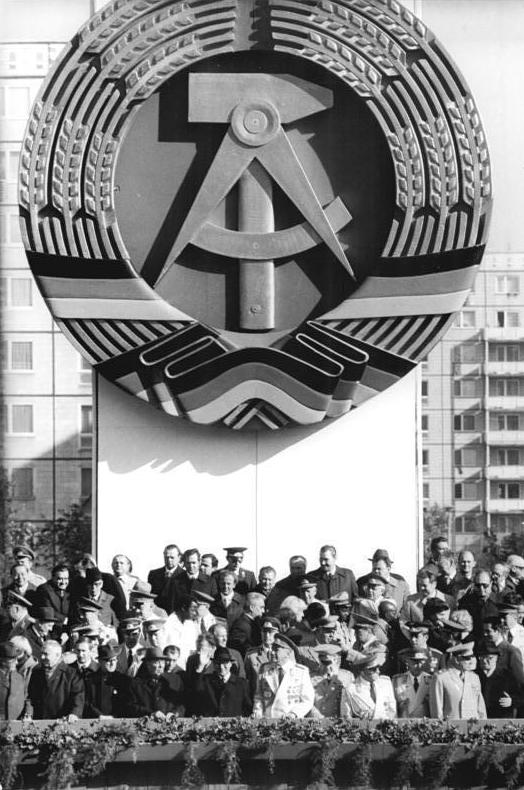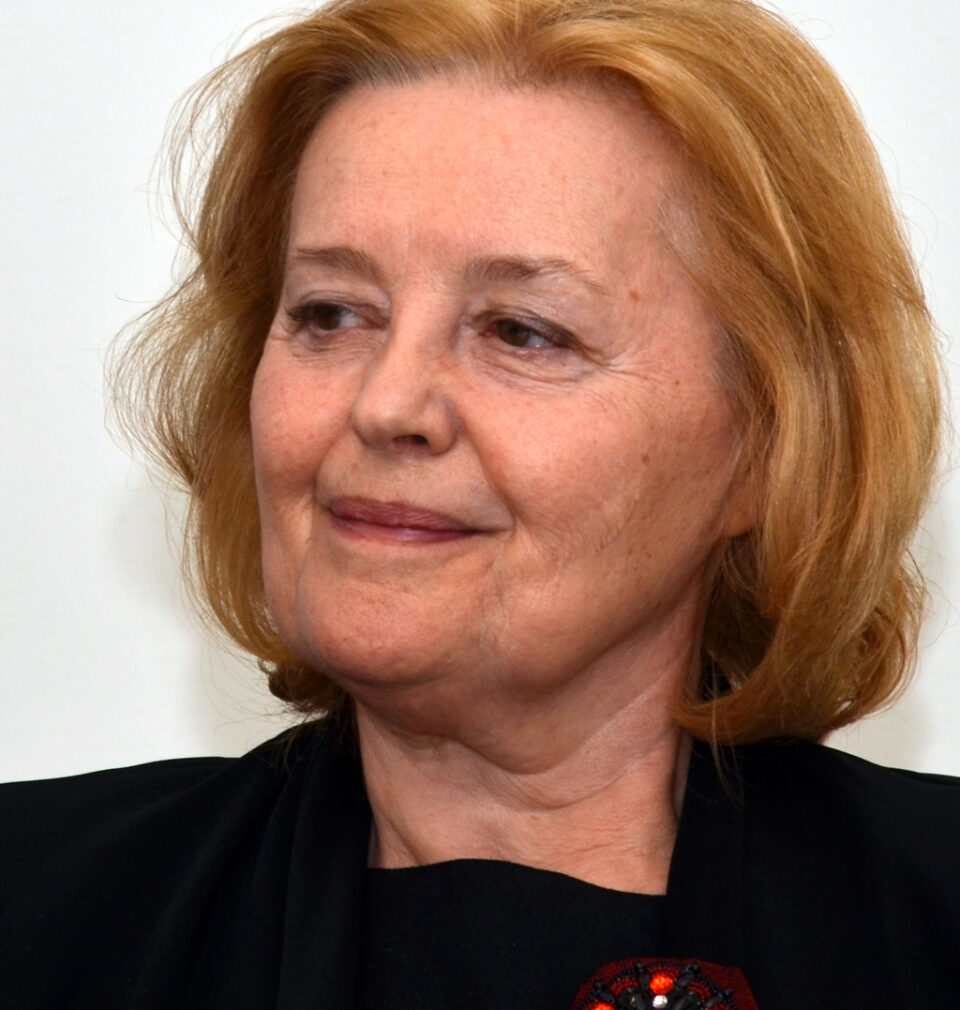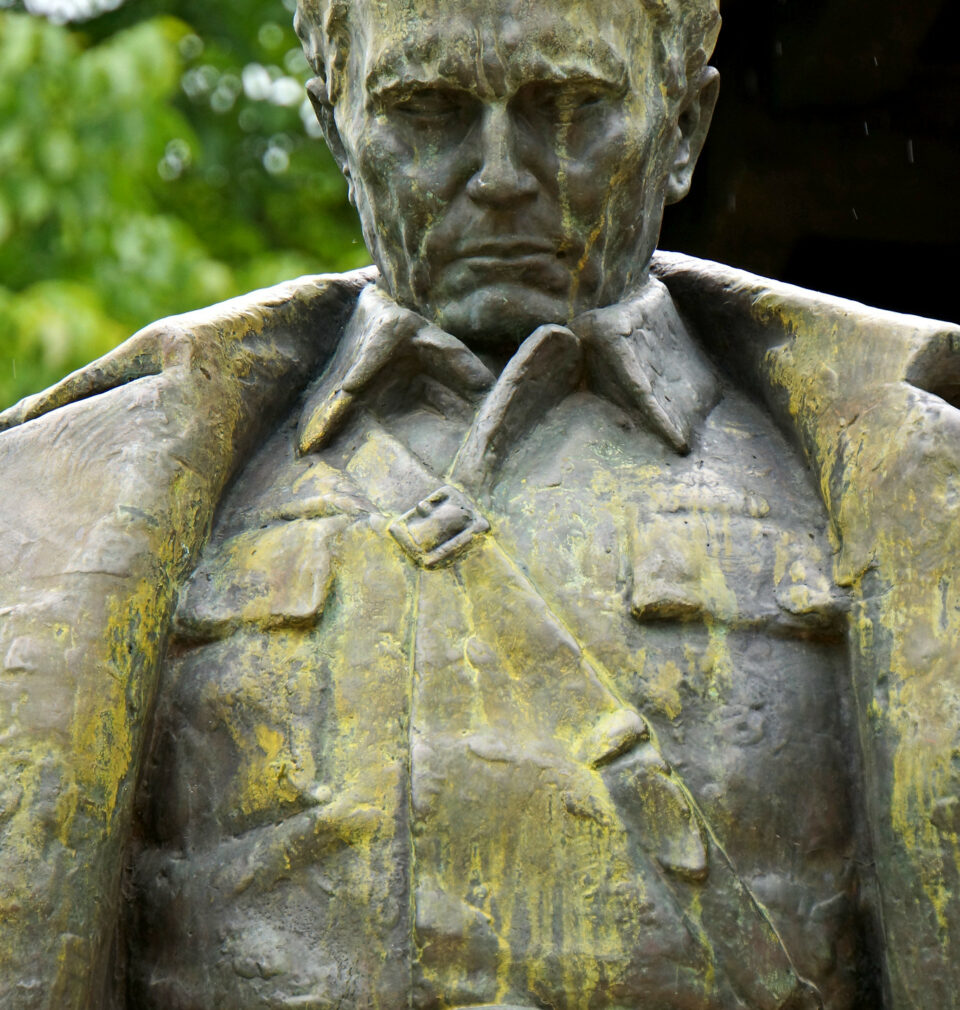
Stories From Countries Which Are no More
A Nation Without People. The German Democratic Republic in the History of Germany
Publication: 13 October 2021
TAGS FOR THE ARTICLE
TO THE LIST OF ARTICLESThe people of the GDR did not have a name, and despite many attempts in the East and West, there has been no success in finding the right name for them, even with the perspective of time. And just like in the Austro-Hungarian Empire, the problem was not only of a political nature.
In September 1944 in Quebec (Canada) a meeting took place between the American president, Franklin D. Roosevelt, and the British prime minister, Winston S. Churchill. The talks focused on the plans that the American Secretary of the Treasury, Henry Mogentau Jr., had to transform Germany into an agricultural country. Churchill was not particularly enthusiastic towards this proposal as he feared the “bolshevisation” of Europe. Thus, the main leaders of the Anglo-Saxon forces had quite a topic to discuss. In addition, the division of Germany into zones of occupation was still an open issue. From Churchill’s memoirs we can read that one afternoon Roosevelt opened a large map of Germany on his lap. He wanted the United States to get the north-western part of the country with direct access to the sea. The British prime minister dismissed this idea, and with a piece of yellow chalk they marked the future borders of the division together. The decision was made almost incidentally. The leadership of the Russian army was the last one to learn about these arrangements, but made no objections as Russia gained quite a vast area. The claims put forward by France, one of the winning allies, were simply forgotten on that day in September 1944. The same happened to other nations who had fought against Nazi Germany; nobody asked them, nor their governments in exile, for their opinion. What’s more, they weren’t even informed about the decisions made. It didn’t take long before Church-ill started regretting the Quebec Agreement. Even be-fore military action had fi nished in Europe, he realised that the area, which had been assigned to Russia, was too big. On April 18th 1945, in a dispatch sent to the new American president, Harry S. Trumann, he wrote: “These occupational zones were outlined rather hastily at Quebec in September 1944 when it was not foreseen that General Eisenhower’s armies would make such mighty inroads into Germany.”
But it was too late. In the first week of July 1945 the British and Americans withdrew to take the agreed positions and their place was taken over by the Red Army. At the same time the outposts of the western allies entered the territory of Greater Berlin to take control over their sectors. The yellow line marked on that map of Germany became the border as well as world history. For almost half a century, this was the line that divided two opposite blocs and political systems.
Nevertheless, in 1945 nobody thought that a new state would emerge on the territory of the Soviet zone of occupation in the future. Nobody expressed any claims to divide Germany according to the borders which divided the zones of occupation – neither Stalin, nor the western forces, the German communists nor the other parties, not even the Germans themselves. Both the winners and the defeated still thought in categories dictated by the recently fi n-ished war. The Germans, and the German nation, were the defeated enemy and the decision had to be taken about the future of this country and its citizens. The main purpose was to deprive Germany, once and for all, of another possibility of attacking its neighbouring countries.
Additionally, the Soviet Union wasn’t showing any tendencies towards moving the Soviet social model to its sphere of influence. On June 11th 1945 Germany’s Communist Party (Kommunistische Partei Deutschlands) was the first political group to put forward a manifesto directed at the German nation. It demanded the creation of a “democratic and parliamentary republic”. The communist activists believed in finishing the civic revolution of 1848, yet the manifesto did not mention either socialism or the Soviet system. In this context, the first reforms which were introduced by the occupational government – the agricultural reform, expropriation of war criminals, and denazification – fell through. The tactic did not change until the beginning of the Cold War when the first steps to establish a new state were taken.
When the German Democratic Republic (GDR) was established on October 7th 1949, nobody foresaw that this creature which stood on clay legs would last much longer than a year. The living conditions throughout the territory of the GDR were catastrophic and characterised by food and energy shortages, people were stealing and buying up goods to store up for later. The country was ruled by fear and violence. The question remains: were the clamorous songs, the ever triumphant tone of the propaganda films, and the colour posters which depicted bravely taking on leaders of a workforce to work, just a cheap façade or a reflection of the zeitgeist, a reflection of the world of the pioneers discovering new horizons? To this day, those who were the rank and file of the “generation of restorers” back then get sentimental when they remember those good old days. Clearly the war was over and despite the difficulties, people looked to the future with great hope, and the party was setting up a beautiful goal, one which established a sense of community. These ideals were absorbed – almost fully and without much criticism – by the young intellectuals. The GDR would define itself as an anti-fascist alternative to the restoration state which had its capital in Bonn, and which was governed by Revanchists and former Nazis.
June 17th 1953 was a traumatic experience for this generation of Germans. When almost the entire working class went to the streets to scare away the government which, presumably only served blue-collar workers and peasants, the most devoted supporters of the Socialist Unity Party of Germany, or the SED (Sozialistische Einheitspartei Deutschlands) saw a deep and long-lasting rift emerge onto their ideology. From then on they lost their trust in the people. The older members of the party, who remembered that in 1933 it had been the people who had allowed Adolf Hitler to come to power, when seeing crowds of workers burning the red flags, thought about the SA units (Sturmabteilung, or the Assault Division – editor’s note) straight away. The younger generation, on the other hand, felt guilty as it had not been that long yet since they themselves had been flexing their muscles under the swastika as members of either the Hitlerjugend or the Wehrmacht. For that generation, democracy was an empty formula hiding the power of the proprieted class behind a façade of slogans. They knew that the Soviet tanks had prevented the collapse of the GDR and that from now on they could only count on this power. The political domination of the Soviet Union was overwhelming even with the tanks out of the picture. And for Moscow, withdrawing troops from its zone of occupation was not an option; not even for a second. Twenty two divisions spread throughout the GDR created an outpost of the Russian empire in Europe. The GDR was a child of the Cold War and the longer its existence was more stable, the cooler the atmosphere between the blocs was. Hence, it was quite easy for the SED to verbally maintain the rhetoric of unification. A radical change of attitude within the leadership of the SED took place in 1968 when the West German social-liberal coalition introduced a New Eastern Policy. The government of the GDR had reasons to fear that talks with the class enemy from the West could put a shadow on the atmosphere that had so far been created around the Cold War enemies. Hence, they created a new slogan stating that the political thaw required the lawful strengthening of the ideological class struggle. The dialectic of the confrontation of political systems, clearly, asks for the highest level of political alertness. Moreover, for the naive and politically immature minds in the area of ideology, the strategy of relaxing relations and the unnoticeable perpetration into the structures of the enemy might, at first sight, be undetectable. Thus, the answer to the political thaw and normalisation of relations was an increase in distance towards the Federal Republic of Germany.
On September 27th 1974 the viewers of an evening television programme, Aktuelle Kamera, learnt to their surprise, that the People’s Chamber had made some changes in the constitution of the GDR. Unlike in spring 1968 when the constitutional project had been widely discussed, the changes this time had not been consulted earlier. Erich Honecker delivered a speech in which he justified the passing of a “law on complementing and amending the constitution”, and the proposals were then unequivocally passed by parliament. In 1968 the first article of the constitution stated that: “The German Democratic Republic is a socialist state of the German nation.” In 1974, the language of the article changed to: “The German Democratic Republic is a socialist state of workers and farmers.” The eighth article which stated that: “The German Democratic Republic and its citizens […] seek to overcome the di-vision forced on the German nation by imperialism, and to gradually reproach the two German states to the point of their unification on the basis of democracy and socialism,” was completely removed.
In this way, the SED officially said goodbye to the German nation. But this did not change the everyday lives of the GDR’s citizens much. By then, they were already used to a constitution whose beautiful promises did not translate into legal execution, and it made no sense, therefore, to appeal against its pro-visions. This is why it was assumed that the changes in the constitution’s message were meant to have an impact on the international scene and send a signal to the German Federal Republic indicating that its neighbour would consistently follow its own path from now. In a talk with Chancellor Willy Brandt, Willi Stoph, the prime minister of the GDR, asked the question: “What is Germany?” to which Brandt immediately answered: “A hotel in Leipzig.”
The next step was to rename things, and the opportunities for erasing such words as “German” or “Germany” were everywhere. The Leipzig-based Hotel Deutschland (Hotel Germany) was changed into Hotel am Ring, and only a few organisations were able to keep their names. Among them were the German National Railway Company and the Socialist Unity Party of Germany. The latter was also allowed to keep its leading slogan of “A New Germany”. The consequences of these actions included crossing out the word “German” from the second edition of the main German encyclopaedia, Meyers Neues Lexikon, published in 1971. Hence, anyone who wanted to look up what Heinrich Heine had in mind when writing the poem Germany. A Winter’s Tale, would feel quite disappointed when consulting this publication. In 1978, the editors, possibly scared of being ridiculed, decided to add the following seven-verse definition to the four-volume edition: “Germany: until 1945 a state in Central Europe, and systematically divided by foreign and German imperialists over the next few years. Since 1945 the territory of the former Germany has been divided into the German Democratic Republic and the German Federal Republic, two states of opposing political and social systems.”
This situation led to the elimination of an old problem and the creation of a new one. In one of the great excerpts from Robert Musil’s The Man Without Qualities, the author presented an ironic thesis that the Austro-Hungarian Empire had been defeated be-cause its inhabitants lacked a name. The Hungarians were Hungarians – he writes – and “only among people who did not understand their language, were they also extrinsically regarded as Austro-Hungarians, while the Austrians, from the beginning, were ‘nothing’ and were expected to feel, according to the wishes of their supervisors, to be Austro-Hungarians or Austrians and Hungarians simultaneously, for which, anyway, there was a lack of an adequate name […] Since the beginning of the world no one has yet died from a language mistake in a name, but it needs to be pointed out that the Austrian and Hungarian, or Austro-Hungarian, dual monarchy fell apart because of an unpronounceable name.”[1]
The people of the GDR also did not have a name, and despite many attempts in the East and West, even from the perspective of time, there has been no success in finding the right name for them. And just like in the Austro-Hungarian Empire, the problem was not only of a political nature. It rather reflected the general political situation. Hence, the government-coined name “citizen of GDR” was regarded as a strictly legal term, used only in official language. Identity would be rooted in something more than a forced imprisonment within one state.
This is why the collectively formulated postulate of Germany’s unification in the autumn of 1989 could be called a miracle. This postulate, which only emerged after the demonstrations in October and early November, was first heard about on November 4th, during mass demonstrations at Berlin’s Alexanderplatz, where one could hear talks about reforms, expanding democracy, as well as democratic socialism. No one was demanding the elimination of the GDR. Yet, after the fall of the Berlin Wall on November 9th, the situation started to change dramatically. When Helmut Kohl arrived in the GDR in December 1989 to discuss the issue of economic aid with the new prime minister, Hans Modrow, the atmosphere was completely different. Hans Modrow and his guest, Helmut Kohl, heard a loud shout from the crowd, slightly tinged with a Saxon accent: “Germany, united homeland! Germany, united homeland!” The people gathered at Theatre Square in Dresden were chanting a verse of the GDR’s national anthem, waving green and white Saxony flags and black-red-yellow flags with the hammer, compass and wheat wreath removed. Hans Modrow looked like a beaten dog. Standing next to the portly Helmut Kohl, he looked miserable and had dishevelled hair. The relations between these two German cousins, who after 40 years of discord, had met at a family reunion was reflected in the physical disproportion between these two men. On one side, there was the economically destroyed, morally discredited, and abandoned by Eastern protectorates GDR, while on the other side was the rich, confident of its own force and power, victorious GFR. It seems that in the face of the patriotic euphoria of the traditionally calm Saxonians, even Helmut Kohl and his companions lost their earlier self-confidence. In essence, the situation was very bizarre. One verse of the GDR’s national anthem, which had been ridiculed in the West and forbidden in the East, became the symbol of the demonstrators who were demanding, no more and no less, the dissolution of their state and the unification of Germany. Next to the mass, democratic movement of citizens of the GDR, which had emerged spontaneously and unexpectedly in October 1989, this was the second miracle of this stormy year of change. The fact that the people of the GDR longed for greater freedom, democracy and better living conditions was noticed both in the West and by the leadership of the SED, although each side would describe this state of affairs in very different words. What the analysts seemed to have missed, however, was the fact that, deep down, the people of East Germany also longed for unification.
The postulate for the dissolution of the GDR never emerged from any claims made by opposition groups in the 1980s. Until the late autumn of 1989, for well-known reasons, the issue of national identity was postponed to an undetermined, historical future date. In the opposition’s view, questioning the global stability, based on the dualism of the big powers, would be irresponsible behaviour. Internal discussions were dominated by a belief that before engaging in talks on its relations with the GFR, the GDR first needed freedom and democracy. A German federation seemed possible only within a European system of security. The opposition, if at all interested in the issues of foreign policy, believed that peace, disarmament and demilitarisation were more important than the unity of the nation. The emigration movement of the summer of 1989, which struck the final political crisis, also took its energy from the readiness to undertake risks by people who believed that the GDR would still exist for a long time. This was why these people were ready to leave their flats, workplaces, and friends. And it is for this reason that they decided to start their journeys from Prague and Budapest into the unknown. The impulse which had brought the system down, thus, came from people, who did not believe in its end. The same diagnosis was made by opponents, critics, and supporters of the Socialist Unity Party of Germany: the GDR existed on the strong grounds of the established world order. However, such a state of affairs did not rule out evolutionary processes. A vortex suddenly emerged that nobody could resist – neither the government of the GFR, the western states, nor even the Soviet Union. The road to unification didn’t leave any alternatives. The elections results which gave a clear advantage to the Christian Democratic Union of Germany (CDU) in the first elections to the People’s Chamber on March 18th 1990, were a voice demanding unification, which eventually took place on October 3rd 1991.
Together with the death of the GDR, a “GDR identity” was born, which started a new and final chapter in the history of the state. What also emerged was a sort of imitation of the so often mentioned unity of the party and nation. With the passing of each year, the GDR started to look more and more beautiful. By the late 1990s a new phrase Ostalgie had become very popular. It was coined by one of the cabaret writers and involved blending two words: Osten (East) and Nostalgie (nostalgia), and the phrase quickly entered everyday language. The cultivation of memories of the GDR, however, is only possible due to the unlikelihood of the return to socialism. And this current fascination with the past cannot be changed by scientific research, films, documents or any other memories of the reality of the socialism which once existed. In addition to the simple fact that 30 years ago everything was better because every one of us was 30 years younger, it is also important to understand the disappointments which came with the years of great change. The difference in living conditions is still significant, unemployment in the eastern areas is still consistently higher, and the migration of highly qualified and ambitious young people to the West is ongoing. The city of Berlin and the lands in the eastern part of the country will continue to be dependent on the money transfers obtained from the programme of equalising the budgets of the two German states for quite some time.
It has become a rule that southern and western German politicians demand to stop these payments before elections. Left-wing parties blame capitalism for the unsatisfactory economic situation, and their supporters rub their hands together when the young people set up tents in the banking districts of large cities to protest against the money powerhouses.
In 1949 the Russian zone of occupation was transformed into a state which no one, outside the Communist Bloc, wanted to recognise. Against all difficulties, this state lasted for 40 years and behind its wired border the almost idyllic living conditions for its citizens were created. It seemed that the world has forgotten about this small state which spread from Cape Arkona to the Fichtel Mountains. Then, the life of this country was brutally shaken by history. Wiped off the world map, it became a territory of unfulfilled social and political dreams. A utopia feeding on the past. A utopia, however, which has no power to strike back at the sad failure which it experienced in the real world.
Translated from Polish by Iwona Reichardt
This text was written thanks to cooperation with the Goethe Institute in Krakow.
***
[1] Robert Musil, Człowiek bez właściwości, vol. 2, p. 176–177, Warszawa 2002.
Copyright © Herito 2020



